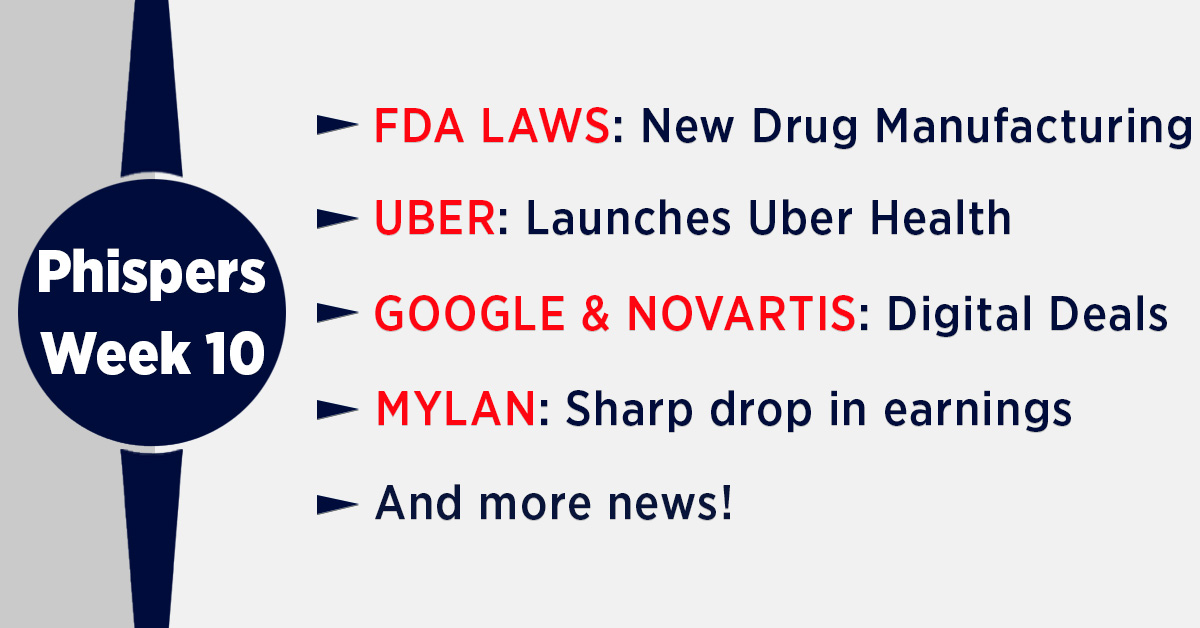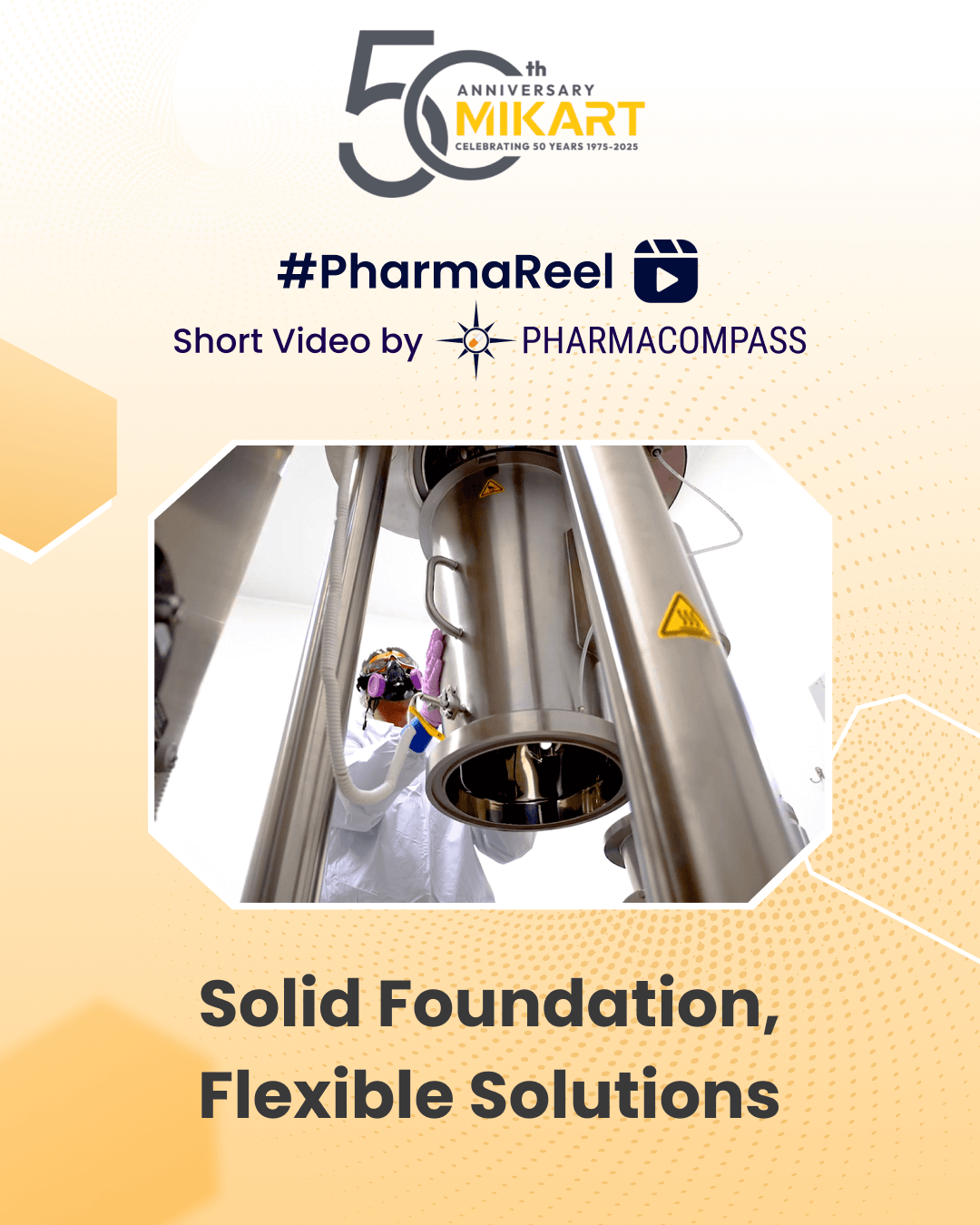
This week, Phispers brings you news on Uber Health, a new desktop platform for healthcare providers that allows doctors to provide rides for their patients who might have otherwise missed their appointment. There is news on Novartis tying up with Pear Therapeutics to launch mobile apps for patients with schizophrenia and multiple sclerosis. Meanwhile, four member states of the EU joined the FDA and EU’s mutual recognition of inspection program. Mylan reported a sharp drop in earnings. The USFDA refused to consider Celgene’s application for its potential blockbuster multiple sclerosis drug — ozanimod. And fraudster Martin Shkreli was ordered to forfeit assets worth US$ 7.36 million in order to honor his criminal sentence.
How FDA laws
are moving manufacturing of new drugs outside the United States
Though this is definitely not the USFDA’s intent, a blog written by David C. Gibbons & Dara Katcher Levy on the website FDA Law Blog said “the net effect of FDA’s requirements surrounding importation of active pharmaceutical ingredients (APIs) is driving manufacturing of investigational finished drug products outside the United States”.
“In its most egregious implementation, FDA’s current interpretation sets up a Catch-22 in which a batch of investigational API cannot be imported for manufacture of finished drug product without an IND (investigational new drug), but an IND cannot be obtained without analyses and stability data on that drug product,” the blog said.
“As a result, investigational API and drug product, from a practical perspective, must be made entirely within or entirely outside the US. Because API manufacturing is largely done outside the US, FDA’s requirements have the effect of encouraging sponsors to manufacture outside the US to the detriment of pharmaceutical developers, US contract manufacturers and patients,” it added.
According to the blog, recent estimates from the FDA indicate that approximately 80 percent of APIs used in the US drug supply are manufactured in more than 150 countries.
Uber launches
Uber Health; Google ties
up with Flex to analyze medical device data
In the US, ride-hailing company Uber launched a new business line called Uber Health last week. This is a desktop platform for healthcare providers. It allows doctors to provide rides for patients who might otherwise have missed their appointments due to transportation-related issues.
The creation of Uber Health is driven by some alarming statistics about patient care and absenteeism. Around 3.6 million Americans miss their medical appointments owing to a lack of available, reliable transportation, Uber Health general manager Chris Weber said. In the US, missed appointments cost healthcare providers US$ 150 billion a year, with no-show rates as high as 30 percent.
The benefits to doctors and hospitals of Uber Health include on-demand scheduling, destination tracking and lower costs.
Meanwhile, Google has signed a key cloud computing deal with Flex — a publicly-traded electronics manufacturer that provides components for Sonos speakers, Nespresso coffee machines and a large number of medical devices the world over.
Flex has unveiled BrightInsight, a platform to help healthcare device manufacturers hook up their gadgetry to the internet, and to other gadgets. The service is built on top of Google Cloud, but sold by Flex directly to the device manufacturers.
The objective is to “provide a standard way for medical devices to shunt data up to the internet for analysis,” Kal Patel, MD, Flex’s senior vice president of digital health, said. This is important as so much data from devices, such as insulin pumps and pacemakers, goes unused.
Novartis, Pear
Therapeutics tie up for mobile apps for schizophrenia, MS patients
Pharma giant Novartis is pairing up with Pear Therapeutics to develop new mobile apps for patients with schizophrenia and relapsing multiple sclerosis.
Pear Therapeutics is a leading digital therapeutics company that designs software applications to effectively improve clinical outcomes for patients.
A few months ago, Pear won a US Food and Drug Administration (USFDA) approval for an application designed to help patients with substance abuse disorder.
“The two companies plan to pursue approval for Pear’s existing ThriveTM digital therapeutic, which is a late-stage therapeutic asset, supported by proof-of-concept efficacy data as well as long-term engagement data, across three clinical studies, consisting of over 1,000 patients diagnosed with schizophrenia,” a press statement issued by Pear Therapeutics said.
The parties will also work together to develop a new therapeutic application to alleviate disease burden in patients with multiple sclerosis, which they will then seek to validate in clinical studies, it added.
More join FDA-EU’s mutual recognition program; May wants UK to be part of EMA
Four member states of the European Union — the Czech Republic, Greece, Hungary and Romania — have now joined the mutual recognition of inspections of manufacturing sites for human medicines program. This program was initiated by the US and eight other EU countries (Austria, Croatia, France, Italy, Malta, Spain, Sweden, United Kingdom) on November 1, 2017.
This important agreement, which updates the mutual recognition agreement from 1998, strengthens the reliance on each other’s inspection expertise and resources.
The European Medicines Agency (EMA) said plans are on track for the mutual recognition agreement to be operational in all member states by July 15, 2019.
Mutual benefits under the agreement for both EU and FDA authorities include: Avoiding duplicative inspections and reducing the administrative burden and costs, improving the use of inspection resources to focus on manufacturing sites of higher risk, and improving the ability to identify and address potential problems at manufacturing sites before they become a public health risk.
Last week, the UK Prime Minister Theresa May called for exploring the terms by which the UK could leave the EU but remain a part of some EU agencies, such as the EMA.
“Membership of the European Medicines Agency would mean investment in new innovative medicines continuing in the UK, and it would mean these medicines getting to patients faster as firms prioritize larger markets when they start the lengthy process of seeking authorizations,” May said.
Meanwhile, the EMA has published a new tool showing the main milestones and deliverables for the Agency’s move to Amsterdam by March 29, 2019. Because of its important role to safeguard public and animal health in the EU, EMA is committed to giving stakeholders and the public full visibility of the relocation project.
Mylan
reports sharp drop in earnings
Last week, Mylan NV announced its fourth-quarter earnings which fell due to declining revenue from its EpiPen allergy injector and weak US prices for generic drugs.
Mylan’s net income was down from US$ 417.5 million last year to US$ 244.3 million this year. Revenue in the October to December 2017 quarter fell 1 percent to US$ 3.24 billion, falling short of analyst expectation of US$ 3.3 billion.
Celgene
drops the ball on potential blockbuster, strikes alliance with Vividion
The USFDA has refused to consider Celgene’s application for ozanimod, an experimental treatment for relapsing multiple sclerosis. The treatment was being seen as a key to the company’s fortunes.
Celgene had said ozanimod is worth US$ 4 billion to US$ 6 billion a year in peak sales. But now, the company has received a refuse-to-file (RTF) letter from the FDA for the treatment.
According to an article published in the Forbes, the RTF letter is an embarrassing event for any drug company. RTF letters tend to signal real problems with the drugs involved, and most of the time the new medicine is not approved for years.
An analysis of 45 RTF letters revealed that 47 percent of them have still not been approved. The average time to approval was 800 days, the median 839 days. Fourteen of the approved drugs were not approved for more than two years.
Meanwhile, Celgene has struck a deal with Vividion Therapeutics. As per the deal, Vividion will help Celgene find new drugs for cancer, inflammation and neurodegenerative diseases. Vividion will receive US$ 101 million in an upfront cash and equity collaboration with Celgene.
Shkreli
will have to forfeit US$ 7.36 million to honor his criminal sentence
As Martin Shkreli, known as pharma bro, prepares for sentencing on securities fraud and conspiracy conviction, he has been ordered to forfeit US$ 7.36 million in assets.
According to the judge Kiyo Matsumoto, Shkreli must forfeit his interest in a set of “substitute” assets, as he was said to be completely cash-broke last year by his lawyer.
Those assets are: US$ 5 million in cash in an e-trade brokerage account that previously had secured his release bond; Shkreli's stake in the drug company Vyera Pharmaceuticals; the Wu-Tang Clan album “Once Upon a Time in Shaolin”; the Lil' Wayne album “The Carter V”; and a painting by Pablo Picasso.
Privately-held Vyera was originally known as Turing Pharmaceuticals, which Shkreli founded in 2015. In 2015, Turing Pharma, founded by Shkreli, had purchased anti-parasite drug Daraprim and raised its price by more than 5,000 percent — from US$ 13.50 per pill to US$ 750 per pill.
In June last year, his lawyer Benjamin Brafman had said Shkreli's share of Vyera was worth between US$ 30 million and US$ 50 million.
The order rejected arguments by Shkreli's attorneys that he should either forfeit nothing or roughly US$ 500,000 at most.
Matsumoto ruled that forfeiture of substitute assets, up to $7,360,450, “is warranted in this case.”
The decision came four days before a scheduled hearing at which Shkreli faces a potential (maximum) prison sentence of 20 years.
The PharmaCompass Newsletter – Sign Up, Stay Ahead
Feedback, help us to improve. Click here
Image Credit : Phisper Infographic by PharmaCompass is licensed under CC BY 2.0
“ The article is based on the information available in public and which the author believes to be true. The author is not disseminating any information, which the author believes or knows, is confidential or in conflict with the privacy of any person. The views expressed or information supplied through this article is mere opinion and observation of the author. The author does not intend to defame, insult or, cause loss or damage to anyone, in any manner, through this article.”





